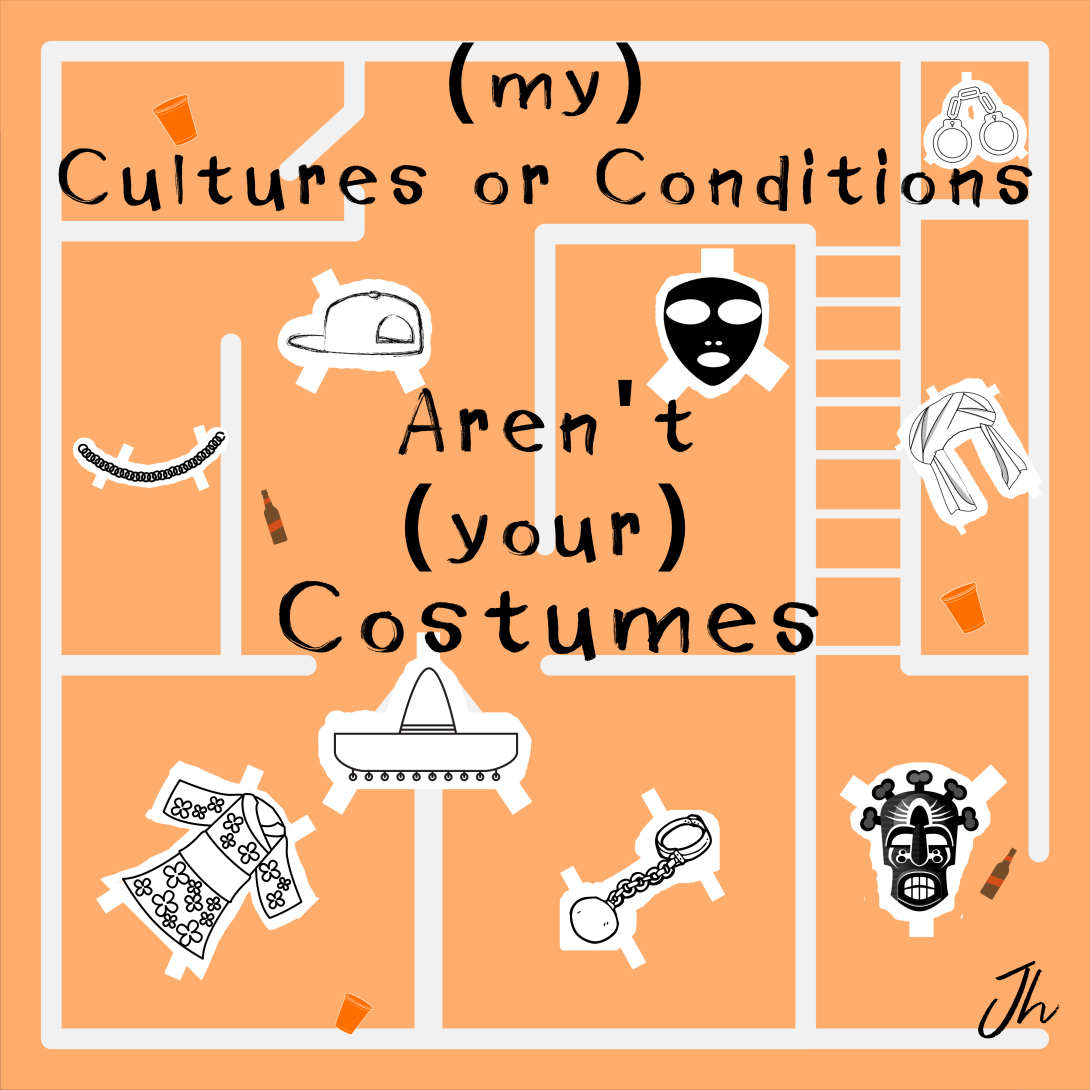October 22, 2019 | By Hannah Brauer, Photographer/Writer Student Lead
Culture isn’t a costume. It’s been said time and time again, but each year cases of inappropriate and offensive Halloween costumes still seem to arise.
The topic of cultural appropriation has been discussed at length in recent years, especially in comparing and contrasting with “cultural appreciation.” But it’s one thing to prepare a dish or listen to music from another culture, and it’s another to embody it in a costume, especially without respect or understanding of that representation.
Alex Kime (they/them), IGR lecturer and former IGR student, has been talking about the topic in their communities for years. They emphasized the importance of research, both when discussing appropriation and when evaluating one’s own Halloween costume.
“I cannot stress enough how important it is to, as marginalized communities, Ernesto Sirroli, and Anne Hathaway’s best friend in The Princess Diaries would say, shut up and listen,” said Kime. “Do the reading. Ask yourself: could I possibly be taking something out of context? … Am I playing into a very long and painful history of exploitation?”
Kime cited the use of racist and culturally insensitive costumes that have contributed to recent scandals, such as the Canadian Prime Minister, but these are not isolated events — the trend resurfaces around Halloween due to a larger systemic issue and a lack of knowledge. Regardless of intent, insensitive costumes make a real impact on oppressed communities by erasing their culture down to a stereotype.
Higher education has an unfortunate history with cultural appropriation. In 2015, a Yale lecturer resigned after defending students’ choices to wear offensive Halloween costumes. Blackface in particular is a significant issue around the country at universities, and many do not have protocol punish the students accountable or prevent future incidents.
The University of Michigan is not exempt from its own culturally insensitive incidents. In 2017, the Michigan Daily reported on themed fraternity parties that ranged from “hood ratchet” to “Cinco de Drinko” and “Ancient Egyptian” themes. These parties promoted appropriative costumes and cultural disrespect, and have sparked many conversations around the topic.
In higher education, it is important to make cultural appropriation into a learning opportunity for students to prevent these incidents from happening, as U-M Expect Respect has promoted in recent years. One way to help others understand the impact of cultural appropriation is through dialogue, said Kime, who understands the power of constructive conversations as a long-time member of the IGR community.
“One person unfortunately can’t reach every person, but by bringing it up in a critical fashion constantly, you can have a far broader reach beyond just getting situationally involved,” they said. “Let the people with kids and all the people you can interact with know about this stuff. Even if you haven’t seen your culture be mocked in this fashion, I try to reframe it away from ‘who are you to have this conversation?’ to ‘who are you not to [have this conversation]?’”
In addition to creating dialogue around the issue, it is also important to look at your own place in the situation and how your actions will make an impact on affected communities.
“Conversations and other interpersonal actions are good, and thinking bigger is even better,” said Kime. “I think a very constructive conversation would include the question: how are we (white people especially) showing up in solidarity with communities of color and less dominant cultures both now and going forward when it isn’t Halloween?”
When deciding your Halloween costume this year, be sure to ask yourself the following:
-
Why am I wearing this costume?
-
Does this costume reference a certain culture/identity?
-
How accurate and/or respectful is it to the culture/identity?
-
Do I have a connection with the culture represented?
-
Can I share my own culture in a costume rather than someone else’s?
Learn more about IGR dialogue at igr.umich.edu.
This article was featured in CAs, a community newsletter through IGR for students interested in social justice education. Subscribe to stay informed on all things IGR.

